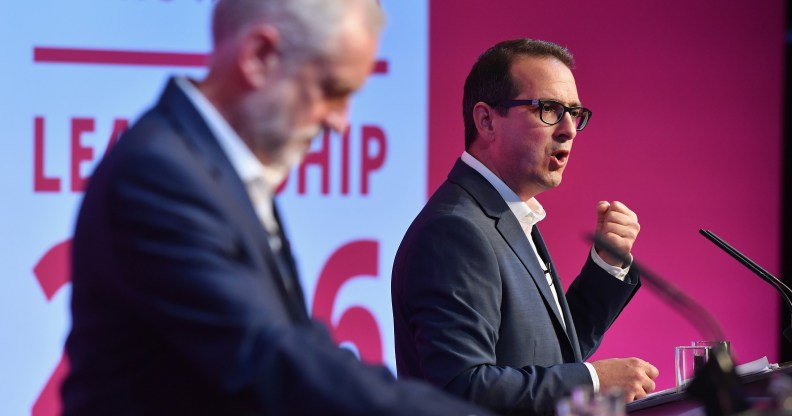Owen Smith: Jeremy Corbyn ‘should not have taken money’ from Iranian propaganda channel

In a PinkNews interview, Labour leadership challenger Owen Smith has questioned why party leader Jeremy Corbyn accepted up to £20,000 for media appearances on Iran’s state-owned Press TV.
Both Mr Corbyn and Mr Smith this week took part in live Q&As with PinkNews readers.
On Wednesday, Mr Corbyn was pressed over his time as a host for the Press TV channel, owned by the Iranian government, during his time as a backbench MP.
According to a register of interests, Mr Corbyn accepted up to £20,000 after hosting five shows on the channel between 2009 and 2012.
Press TV is tightly-controlled by the Iranian government and is seen as a propaganda outlet. It was banned in the UK in 2012, when broadcast regulator Ofcom found it had repeatedly breached the broadcasting code.
In his Q&A today, Mr Smith questioned why the leader took money for any media appearances.
He said: “I wouldn’t have done it. I don’t think Jeremy has done enough to justify that, to be perfectly honest. I’ve not taken any money from any other source other than my Parliamentary salary in the six years I’ve been an MP.
“I think that’s appropriate because I think we get paid enough for doing our jobs and I don’t think we need to get paid extra money for doing journalism.
“I’ve written articles and appeared on television programmes such as I’m doing right now. I’m not asking for payment for this, I’m not asking for payment for anything else – so I don’t know why Jeremy felt he should take any money for any of those appearances.
“He could always give the money back, couldn’t he?”
In his interview with PinkNews, Mr Corbyn said the money for the appearances went into his constituency office.
He said: “I did some programmes for Press TV quite a long time ago.
“I refused to do any more because there was a change in the process they were operating.
“I presented other programmes in which I was able to raise a number of human rights issues, not just in Iran but other countries as well – and the money I was paid, which wasn’t an enormous amount actually, went into my constituency office.
“Obviously, they are free to make the criticism they wish.
“I used the opportunities to address the issues of the Western relationship with the whole region, address the issues of Iraq, and also address issues of human rights.
“Even in a very difficult atmosphere when you’re dealing with countries and governments that clearly don’t have the same human rights agenda that I do or we do around this table.
“Everywhere I’ve ever travelled I’ve always raised the issues of human rights, however easy or difficult it is.”

